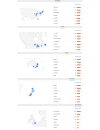"Googling" for Cancer: An Infodemiological Assessment of Online Search Interests in Australia, Canada, New Zealand, the United Kingdom, and the United States
- PMID: 28410185
- PMCID: PMC5369660
- DOI: 10.2196/cancer.5212
"Googling" for Cancer: An Infodemiological Assessment of Online Search Interests in Australia, Canada, New Zealand, the United Kingdom, and the United States
Abstract
Background: The infodemiological analysis of queries from search engines to shed light on the status of various noncommunicable diseases has gained increasing popularity in recent years.
Objective: The aim of the study was to determine the international perspective on the distribution of information seeking in Google regarding "cancer" in major English-speaking countries.
Methods: We used Google Trends service to assess people's interest in searching about "Cancer" classified as "Disease," from January 2004 to December 2015 in Australia, Canada, New Zealand, the United Kingdom, and the United States. Then, we evaluated top cities and their relative search volumes (SVs) and country-specific "Top searches" and "Rising searches." We also evaluated the cross-country correlations of SVs for cancer, as well as rank correlations of SVs from 2010 to 2014 with the incidence of cancer in 2012 in the abovementioned countries.
Results: From 2004 to 2015, the United States (relative SV [from 100]: 63), Canada (62), and Australia (61) were the top countries searching for cancer in Google, followed by New Zealand (54) and the United Kingdom (48). There was a consistent seasonality pattern in searching for cancer in the United States, Canada, Australia, and New Zealand. Baltimore (United States), St John's (Canada), Sydney (Australia), Otaika (New Zealand), and Saint Albans (United Kingdom) had the highest search interest in their corresponding countries. "Breast cancer" was the cancer entity that consistently appeared high in the list of top searches in all 5 countries. The "Rising searches" were "pancreatic cancer" in Canada and "ovarian cancer" in New Zealand. Cross-correlation of SVs was strong between the United States, Canada, and Australia (>.70, P<.01).
Conclusions: Cancer maintained its popularity as a search term for people in the United States, Canada, and Australia, comparably higher than New Zealand and the United Kingdom. The increased interest in searching for keywords related to cancer shows the possible effectiveness of awareness campaigns in increasing societal demand for health information on the Web, to be met in community-wide communication or awareness interventions.
Keywords: Google Trends; Internet; cancer; consumer health information; epidemiology; geographic mapping; infodemiology; neoplasms.
©Forough Foroughi, Alfred K-Y Lam, Megan S.C. Lim, Nassim Saremi, Alireza Ahmadvand. Originally published in JMIR Cancer (http://cancer.jmir.org), 04.05.2016.
Conflict of interest statement
Conflicts of Interest: None declared.
Figures


References
-
- Telfer S, Woodburn J. Let me Google that for you: a time series analysis of seasonality in internet search trends for terms related to foot and ankle pain. J Foot Ankle Res. 2015;8:27. doi: 10.1186/s13047-015-0074-9. http://jfootankleres.biomedcentral.com/articles/10.1186/s13047-015-0074-9 74 - DOI - PMC - PubMed
-
- Eysenbach G. Infodemiology: The epidemiology of (mis)information. Am J Med. 2002 Dec 15;113(9):763–5.S0002934302014730 - PubMed
-
- Eysenbach G. Infodemiology and infoveillance: framework for an emerging set of public health informatics methods to analyze search, communication and publication behavior on the Internet. J Med Internet Res. 2009;11(1):e11. doi: 10.2196/jmir.1157. http://www.jmir.org/2009/1/e11/ v11i1e11 - DOI - PMC - PubMed
-
- Bernardo TM, Rajic A, Young I, Robiadek K, Pham MT, Funk JA. Scoping review on search queries and social media for disease surveillance: a chronology of innovation. J Med Internet Res. 2013;15(7):e147. doi: 10.2196/jmir.2740. http://www.jmir.org/2013/7/e147/ v15i7e147 - DOI - PMC - PubMed
LinkOut - more resources
Full Text Sources
Other Literature Sources
Miscellaneous

